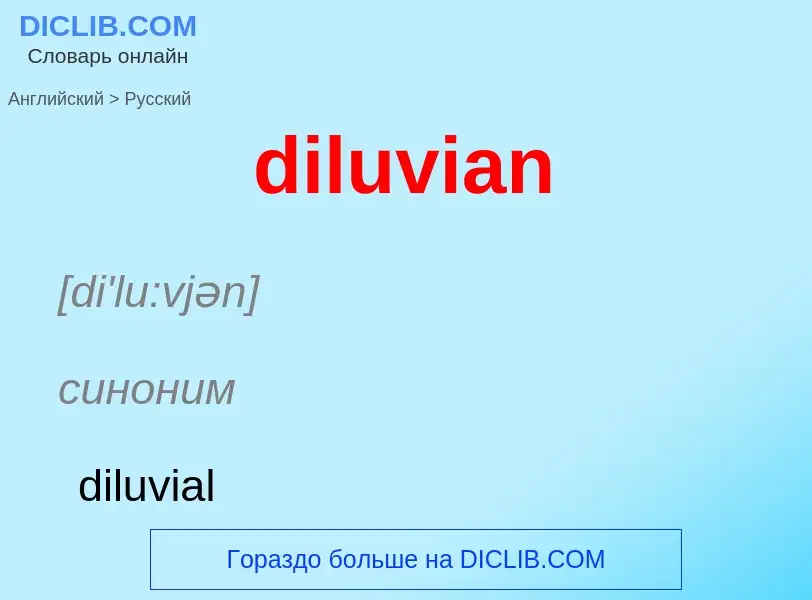Μετάφραση και ανάλυση λέξεων από την τεχνητή νοημοσύνη ChatGPT
Σε αυτήν τη σελίδα μπορείτε να λάβετε μια λεπτομερή ανάλυση μιας λέξης ή μιας φράσης, η οποία δημιουργήθηκε χρησιμοποιώντας το ChatGPT, την καλύτερη τεχνολογία τεχνητής νοημοσύνης μέχρι σήμερα:
- πώς χρησιμοποιείται η λέξη
- συχνότητα χρήσης
- χρησιμοποιείται πιο συχνά στον προφορικό ή γραπτό λόγο
- επιλογές μετάφρασης λέξεων
- παραδείγματα χρήσης (πολλές φράσεις με μετάφραση)
- ετυμολογία
myth mythology - translation to
[di'lu:vjən]
синоним
[miθ]
существительное
общая лексика
миф
несуществующее
выдуманное лицо
несуществующая вещь
мифическое/выдуманное лицо
в переносном значении
вымысел, выдумка
синоним
Ορισμός
Βικιπαίδεια

In Greek mythology, Pandora (Greek: Πανδώρα, derived from πᾶν, pān, i.e. "all" and δῶρον, dōron, i.e. "gift", thus "the all-endowed", "all-gifted" or "all-giving") was the first human woman created by Hephaestus on the instructions of Zeus. As Hesiod related it, each god cooperated by giving her unique gifts. Her other name—inscribed against her figure on a white-ground kylix in the British Museum—is Anesidora (Ancient Greek: Ἀνησιδώρα), "she who sends up gifts" (up implying "from below" within the earth).
The Pandora myth is a kind of theodicy, addressing the question of why there is evil in the world, according to which, Pandora opened a jar (pithos) (commonly referred to as "Pandora's box") releasing all the evils of humanity. It has been argued that Hesiod's interpretation of Pandora's story went on to influence both Jewish and Christian theology and so perpetuated her bad reputation into the Renaissance. Later poets, dramatists, painters and sculptors made her their subject.


![Pandora holding a ''[[pithos]]'', with Hermes, and a seated Prometheus, ''Prometheus, Mercury, and Pandora'', 1814, by [[Josef Abel]] Pandora holding a ''[[pithos]]'', with Hermes, and a seated Prometheus, ''Prometheus, Mercury, and Pandora'', 1814, by [[Josef Abel]]](https://commons.wikimedia.org/wiki/Special:FilePath/Abel-josef-1764-1818-austria-prometheus-merkur-und-die-pand.jpg?width=200)
![Hammer-wielding workmen appear through a doorway, while in the foreground Hephaestus broods on the as yet unanimated figure of "Pandora" in the painting by [[John D. Batten]], ''The Creation of Pandora'', 1913, tempera on fresco, 128 x 168cm, [[Reading University]] Hammer-wielding workmen appear through a doorway, while in the foreground Hephaestus broods on the as yet unanimated figure of "Pandora" in the painting by [[John D. Batten]], ''The Creation of Pandora'', 1913, tempera on fresco, 128 x 168cm, [[Reading University]]](https://commons.wikimedia.org/wiki/Special:FilePath/J.D.Batten Pandora 1913.jpg?width=200)
 - Eva Prima Pandora - WGA05537.jpg?width=200)
![''Pandora'', [[Odilon Redon]]'s c. 1914 oil painting depicting Pandora as an innocent Eve ''Pandora'', [[Odilon Redon]]'s c. 1914 oil painting depicting Pandora as an innocent Eve](https://commons.wikimedia.org/wiki/Special:FilePath/Pandora MET DT2160.jpg?width=200)
![Hermes carrying Pandora down from Mount Olympus, a medal based on a design by [[John Flaxman]] Hermes carrying Pandora down from Mount Olympus, a medal based on a design by [[John Flaxman]]](https://commons.wikimedia.org/wiki/Special:FilePath/Pandora medal 1854.jpg?width=200)
![A ''[[pithos]]'' from Crete, ca. 675 BC ([[Louvre Museum]]) A ''[[pithos]]'' from Crete, ca. 675 BC ([[Louvre Museum]])](https://commons.wikimedia.org/wiki/Special:FilePath/Pithos Louvre CA4523.jpg?width=200)

![Madame Vestris]] in the burlesque ''Prometheus and Pandora'', an 1831 print Madame Vestris]] in the burlesque ''Prometheus and Pandora'', an 1831 print](https://commons.wikimedia.org/wiki/Special:FilePath/Madame Vestris as Pandora.jpg?width=200)
![Christine Nilsson]] as ''Pandora'' by [[Alexandre Cabanel]], 1873 Christine Nilsson]] as ''Pandora'' by [[Alexandre Cabanel]], 1873](https://commons.wikimedia.org/wiki/Special:FilePath/Alexandre Cabanel - Pandora - Walters 3799.jpg?width=200)
![[[Jane Morris]] in the role, [[Dante Gabriel Rossetti]], coloured chalks, 1879 [[Jane Morris]] in the role, [[Dante Gabriel Rossetti]], coloured chalks, 1879](https://commons.wikimedia.org/wiki/Special:FilePath/Pandora-1879.jpg?width=200)
![[[Yvonne Gregory]]’s [[photogram]] recreates a pose from a painting, 1919 [[Yvonne Gregory]]’s [[photogram]] recreates a pose from a painting, 1919](https://commons.wikimedia.org/wiki/Special:FilePath/Yvonne Park - Pandora.png?width=200)

![website=[[Royal Collection Trust]]}}</ref> website=[[Royal Collection Trust]]}}</ref>](https://commons.wikimedia.org/wiki/Special:FilePath/John Martin - The Eve of the Deluge - WGA14146.jpg?width=200)
![George Smith]], who discovered and translated the ''[[Epic of Gilgamesh]]'' George Smith]], who discovered and translated the ''[[Epic of Gilgamesh]]''](https://commons.wikimedia.org/wiki/Special:FilePath/Mr. George Smith, the man who transliterated and read the so-called the Babylonian Flood Story of Tablet XI.jpg?width=200)
![Earth's [[sea level]] rose dramatically in the millennia after the [[Last Glacial Maximum]] Earth's [[sea level]] rose dramatically in the millennia after the [[Last Glacial Maximum]]](https://commons.wikimedia.org/wiki/Special:FilePath/Post-Glacial Sea Level.png?width=200)
![[[Nanabozho]] in [[Ojibwe]] flood story from an illustration by R. C. Armour, in his book ''North American Indian Fairy Tales, Folklore and Legends'' (1905) [[Nanabozho]] in [[Ojibwe]] flood story from an illustration by R. C. Armour, in his book ''North American Indian Fairy Tales, Folklore and Legends'' (1905)](https://commons.wikimedia.org/wiki/Special:FilePath/Manabozhointheflood.png?width=200)
![''The Great Flood'', by anonymous painter, ''The vom Rath bequest'', [[Rijksmuseum]] ''The Great Flood'', by anonymous painter, ''The vom Rath bequest'', [[Rijksmuseum]]](https://commons.wikimedia.org/wiki/Special:FilePath/Anoniem - De zondvloed.jpg?width=200)
![''The Deluge'', by [[Francis Danby]], 1840. Oil on canvas. Tate Gallery ''The Deluge'', by [[Francis Danby]], 1840. Oil on canvas. Tate Gallery](https://commons.wikimedia.org/wiki/Special:FilePath/Francis Danby deluge.jpg?width=200)
![Neptune]] and [[caduceus]] Neptune]] and [[caduceus]]](https://commons.wikimedia.org/wiki/Special:FilePath/10,000 Belgian francs of 1929 (cropped).jpg?width=200)
![Mabinogi myths]] from the [[Red Book of Hergest]] (written pre-13c, incorporating pre-Roman myths of Celtic gods):<br />''Gereint vab Erbin. Arthur a deuodes dala llys yg Caerllion ar Wysc...'' <br />(Geraint the son of Erbin. Arthur was accustomed to hold his Court at Caerlleon upon Usk...) Mabinogi myths]] from the [[Red Book of Hergest]] (written pre-13c, incorporating pre-Roman myths of Celtic gods):<br />''Gereint vab Erbin. Arthur a deuodes dala llys yg Caerllion ar Wysc...'' <br />(Geraint the son of Erbin. Arthur was accustomed to hold his Court at Caerlleon upon Usk...)](https://commons.wikimedia.org/wiki/Special:FilePath/Jesus-College-MS-111 00379 190r (cropped) Geraint.jpg?width=200)
![''Myths and legends of [[Babylonia]] and [[Assyria]]'' (1916) ''Myths and legends of [[Babylonia]] and [[Assyria]]'' (1916)](https://commons.wikimedia.org/wiki/Special:FilePath/Myths and legends of Babylonia and Assyria (1916) (14801987593).jpg?width=200)
![Prometheus Unbound]]'' and ''[[Prometheus Pyrphoros]]''), Prometheus is bound and tortured for giving fire to humanity. Prometheus Unbound]]'' and ''[[Prometheus Pyrphoros]]''), Prometheus is bound and tortured for giving fire to humanity.](https://commons.wikimedia.org/wiki/Special:FilePath/Prometheus by Gustave Moreau.jpg?width=200)
![Finnish mythological]] 19th-century epic poetry, ''[[The Kalevala]]''. <small>(''Väinämöinen's Play'', Robert Wilhelm Ekman, 1866)</small> Finnish mythological]] 19th-century epic poetry, ''[[The Kalevala]]''. <small>(''Väinämöinen's Play'', Robert Wilhelm Ekman, 1866)</small>](https://commons.wikimedia.org/wiki/Special:FilePath/Robert Wilhelm Ekman - Väinämöinen’s Play.jpg?width=200)
